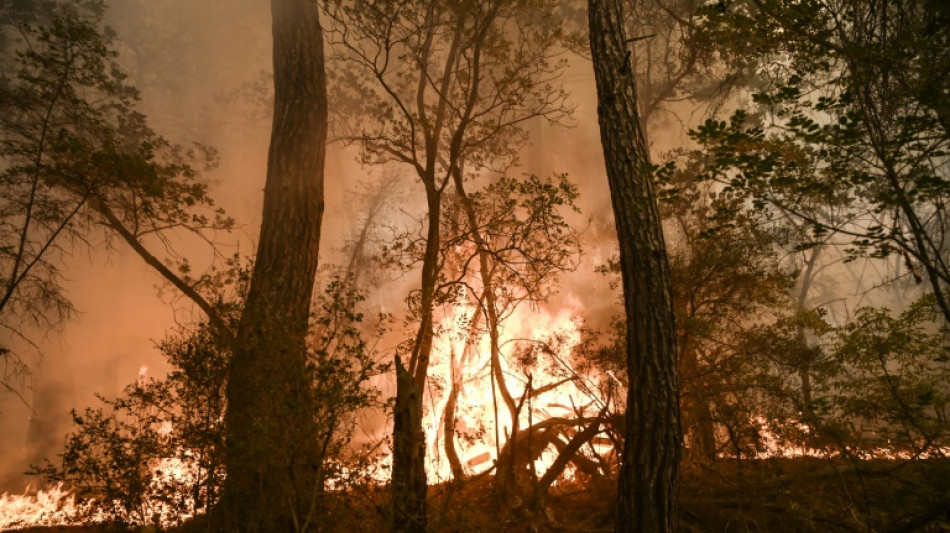
-
 USA defeat Canada for Olympic men's ice hockey gold, Trump celebrates
USA defeat Canada for Olympic men's ice hockey gold, Trump celebrates
-
EU 'expects' US to honour trade deal as Trump hikes tariffs

-
 'GOAT' battles to top of N. America box office
'GOAT' battles to top of N. America box office
-
South Africa thrash India to end 12-match T20 World Cup win streak

-
 Bielle-Biarrey breaks record as France beat Italy in Six Nations
Bielle-Biarrey breaks record as France beat Italy in Six Nations
-
US says trade deals in force despite court ruling on tariffs

-
 Barcelona back top of La Liga with Levante win
Barcelona back top of La Liga with Levante win
-
Gu strikes gold, USA beat Canada in men's ice hockey

-
 What's behind England's Six Nations slump?
What's behind England's Six Nations slump?
-
Napoli rage at officials after loss at Atalanta

-
 Liverpool late show floors Nottingham Forest
Liverpool late show floors Nottingham Forest
-
Rimac Nevera R: Beyond imagination

-
 USA beat Canada to win men's Olympic ice hockey gold
USA beat Canada to win men's Olympic ice hockey gold
-
Samardzic seals comeback win for Atalanta over Napoli

-
 Eileen Gu switches slopes for catwalk after Olympic flourish
Eileen Gu switches slopes for catwalk after Olympic flourish
-
Luce: Ferrari's ingenious electric revolution

-
 Miller guides South Africa to 187-7 against India
Miller guides South Africa to 187-7 against India
-
Scotland boss 'proud' of comeback Six Nations win over Wales

-
 Iranian students rally for second day as fears of war with US mount
Iranian students rally for second day as fears of war with US mount
-
US Secret Service kills man trying to access Trump Florida estate

-
 Coventry 'let the Games do their magic': former IOC executives
Coventry 'let the Games do their magic': former IOC executives
-
Cayenne Turbo Electric 2026

-
 Sri Lanka have to qualify 'the hard way' after England drubbing
Sri Lanka have to qualify 'the hard way' after England drubbing
-
Doris says Six Nations rout of England is sparking Irish 'belief'

-
 Thousands of pilgrims visit remains of St Francis
Thousands of pilgrims visit remains of St Francis
-
Emotional Gu makes history with Olympic freeski halfpipe gold

-
 Impressive Del Toro takes statement victory in UAE
Impressive Del Toro takes statement victory in UAE
-
Gu wins triumphant gold of Milan-Cortina Olympics before ice hockey finale

-
 England rout Sri Lanka for 95 to win Super Eights opener
England rout Sri Lanka for 95 to win Super Eights opener
-
Underhill tells struggling England to maintain Six Nations 'trust' as Italy await

-
 Alfa Tonale 2026: With a new look
Alfa Tonale 2026: With a new look
-
BMW 7 Series and i7: facelift in 2026

-
 Eileen Gu makes history with Olympic freeski halfpipe gold
Eileen Gu makes history with Olympic freeski halfpipe gold
-
Eileen Gu makes history with Olympic halfpipe gold

-
 Morocco flood evacuees mark muted Ramadan away from home
Morocco flood evacuees mark muted Ramadan away from home
-
Lucid Gravity 2026: Test report

-
 Sri Lanka restrict England to 146-9 in T20 World Cup Super Eights
Sri Lanka restrict England to 146-9 in T20 World Cup Super Eights
-
West Indies wary of Zimbabwe's 'X-factor' quick Muzarabani

-
 Bentley: Visions for 2026
Bentley: Visions for 2026
-
Eileen Gu wins Olympic gold in women's freeski halfpipe

-
 First 'dispersed' Winter Olympics a success -- and snow helped
First 'dispersed' Winter Olympics a success -- and snow helped
-
Six stand-out moments from the 2026 Winter Olympics

-
 Andrew's arrest hands King Charles fresh royal crisis
Andrew's arrest hands King Charles fresh royal crisis
-
Afghans mourn villagers killed in Pakistani strikes

-
 Jeeno Thitikul brings home LPGA win in Thailand
Jeeno Thitikul brings home LPGA win in Thailand
-
Snowboard champion Karl '99 percent' sure parallel giant slalom will stay in Olympics

-
 Greenland does not need US hospital ship: Danish minister
Greenland does not need US hospital ship: Danish minister
-
Russian missile barrage hits energy, railways across Ukraine

-
 Ka Ying Rising makes Hong Kong racing history with 18th win
Ka Ying Rising makes Hong Kong racing history with 18th win
-
St Francis relics go on public show for first time in Italy


Forest fires: a record year
As the deadliest year this century for forest fires comes to a close, attention is turning to how to prevent such infernos happening again.
In 2023 forest fires destroyed nearly 400 million hectares (988 million acres) of land around the world, killed more than 250 people and emitted 6.5 billion tonnes of the greenhouse gas carbon dioxide.
Pauline Vilain-Carlotti, a researcher in geography and wildfires, told AFP 2023's fires had been "out of control" and showed that firefighting capacities were inadequate. Efforts should now be focussed on prevention rather than cure.
"We are no longer capable of coping under current conditions with the current firefighting manpower, thus the importance of acting beforehand on prevention, rather than afterwards on firefighting and extinguishing," she said.
- Historic fires in Canada -
Records tumbled on the American continent this year as it went through a forest fire season in which nearly 80 million hectares (198 million acres) had burned by December 23.
That is one and a half times the surface area of Spain, and 10 million hectares (24 million acres) more than the average from 2012-2022 on the same date, according to the Global Wildfire Information System (GWIS).
Canada, where 18 million hectares (44.5 million acres) went up in smoke over the year, drove the increase.
The fires were caused by dryer and hotter weather conditions driven by climate change.
- Deadly year -
With 97 dead and 31 missing in fires in Hawaii in August, 34 killed in Algeria, and at least 26 dead in Greece, the year with more than 250 deaths overall was the deadliest of the 21st century, according to the Emergency Events Database (EM-DAT) run by the Catholic University of Louvain in Belgium.
Vilain-Carlotti told AFP the rate of excess deaths risks increasing in the coming years, as wildfires come dangerously close to towns and cities.
In 2023 the wildfires engulfed not only areas usually susceptible to forest fires like Greece, Italy, Tunisia, and Algeria in the Mediterranean basin and North America and Australia, but also areas which are usually spared like Hawaii or Tenerife.
In August, Hawaii's historic royal seat of Lahaina was levelled by a wildfire.
- Six billion tonnes of CO2 -
As the fires spread even further, vegetation has less time to regrow, leaving the forests liable to lose their capacity to absorb carbon dioxide.
According to recent studies, the fires reduce the storage of carbon dioxide by around 10 percent, Solene Turquety, a researcher at France's LATMOS (Atmospheres, Environments, Space Observations Laboratory), said.
And as they burn, the trees suddenly release all of the CO2 that they have stored.
Since the beginning of 2023, wildfires have released some 6.5 billion tonnes of carbon dioxide, according to GWIS.
That compares to 36.8 billion tonnes from fossil fuels like oil, gas and coal and cement.
As a rule, around 80 percent of carbon generated by the forest fires is then reabsorbed by the vegetation which grows again the next season.
The remaining 20 percent then builds up in the atmosphere, contributing the climate change.
- Immediate health impact -
Apart from CO2, fires release a string of dangerous particles, from carbon monoxide to ash, soot, and organic carbon.
"These emissions very heavily alter the air quality, over hundreds of kilometres (miles) in the case of the most intense fires," Turquety said.
She said there is "an immediate health impact" on top of "the destruction of ecosystems, property and infrastructure".
According to a study published in September in Nature, the populations of the poorest countries, in particular in central Africa, are by far more exposed to the air pollution caused by these fires than those in industrialised countries.
Y.Nakamura--AMWN



